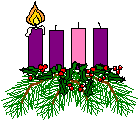
No eye has seen, nor ear heard, nor the heart of man conceived what God has prepared for those who love him. 1:Cor 2:9
It's Advent. We wait and prepare for what we know will happen. God is made man. God Himself, the very knitter of our lives, the First Mover, the ultimate, the Lord of everything that has ever been made -- this God chooses to become one of us.
We take it for granted. We've known about the Christmas narrative all our lives, many of us, so it takes on a misty feeling of inevitability. But -- stay with me here -- there is no earthly reason why God should have chosen to do this. He created us, loved us, yes. But when your creation screws up royally, you are well within your rights and certainly within your power to trash it and start again. Our story could have ended right there.
But no. No. There's more.
And that's what we celebrate. We wait for the quiet holy day when a peasant girl and her fiance are visited by the miracle of miracles in a damp, musty stable. It's glorious enough and tender enough that it should make us gasp or weep. God didn't have to do it. But He did.
So we wait in joyful hope for the coming of the Savior, knowing that our lives have never been the same again.